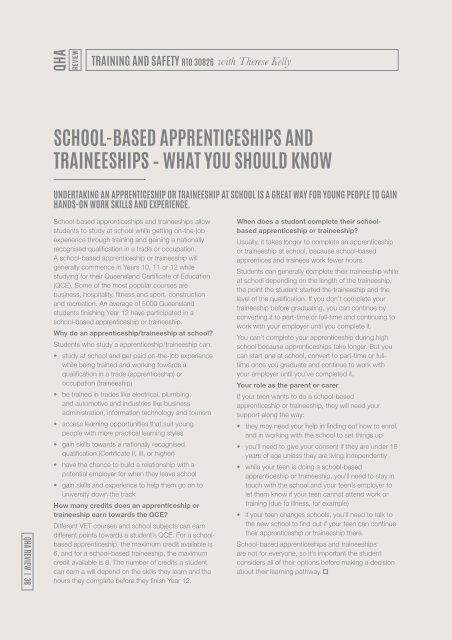QHA-Review_July_digital
You also want an ePaper? Increase the reach of your titles
YUMPU automatically turns print PDFs into web optimized ePapers that Google loves.
TRAINING AND SAFETY RTO 30826<br />
with Therese Kelly<br />
SCHOOL-BASED APPRENTICESHIPS AND<br />
TRAINEESHIPS – WHAT YOU SHOULD KNOW<br />
UNDERTAKING AN APPRENTICESHIP OR TRAINEESHIP AT SCHOOL IS A GREAT WAY FOR YOUNG PEOPLE TO GAIN<br />
HANDS-ON WORK SKILLS AND EXPERIENCE.<br />
<strong>QHA</strong> REVIEW | 38<br />
School-based apprenticeships and traineeships allow<br />
students to study at school while getting on-the-job<br />
experience through training and gaining a nationally<br />
recognised qualification in a trade or occupation.<br />
A school-based apprenticeship or traineeship will<br />
generally commence in Years 10, 11 or 12 while<br />
studying for their Queensland Certificate of Education<br />
(QCE). Some of the most popular courses are<br />
business, hospitality, fitness and sport, construction<br />
and recreation. An average of 5000 Queensland<br />
students finishing Year 12 have participated in a<br />
school-based apprenticeship or traineeship.<br />
Why do an apprenticeship/traineeship at school?<br />
Students who study a apprenticeship/traineeship can:<br />
• study at school and get paid on-the-job experience<br />
while being trained and working towards a<br />
qualification in a trade (apprenticeship) or<br />
occupation (traineeship)<br />
• be trained in trades like electrical, plumbing,<br />
and automotive and industries like business<br />
administration, information technology and tourism<br />
• access learning opportunities that suit young<br />
people with more practical learning styles<br />
• gain skills towards a nationally recognised<br />
qualification (Certificate II, III, or higher)<br />
• have the chance to build a relationship with a<br />
potential employer for when they leave school<br />
• gain skills and experience to help them go on to<br />
university down the track<br />
How many credits does an apprenticeship or<br />
traineeship earn towards the QCE?<br />
Different VET courses and school subjects can earn<br />
different points towards a student’s QCE. For a schoolbased<br />
apprenticeship, the maximum credit available is<br />
6, and for a school-based traineeship, the maximum<br />
credit available is 8. The number of credits a student<br />
can earn a will depend on the skills they learn and the<br />
hours they complete before they finish Year 12.<br />
When does a student complete their schoolbased<br />
apprenticeship or traineeship?<br />
Usually, it takes longer to complete an apprenticeship<br />
or traineeship at school, because school-based<br />
apprentices and trainees work fewer hours.<br />
Students can generally complete their traineeship while<br />
at school depending on the length of the traineeship,<br />
the point the student started the traineeship and the<br />
level of the qualification. If you don’t complete your<br />
traineeship before graduating, you can continue by<br />
converting it to part-time or full-time and continuing to<br />
work with your employer until you complete it.<br />
You can’t complete your apprenticeship during high<br />
school because apprenticeships take longer. But you<br />
can start one at school, convert to part-time or fulltime<br />
once you graduate and continue to work with<br />
your employer until you’ve completed it.<br />
Your role as the parent or carer<br />
If your teen wants to do a school-based<br />
apprenticeship or traineeship, they will need your<br />
support along the way:<br />
• they may need your help in finding out how to enrol,<br />
and in working with the school to set things up<br />
• you’ll need to give your consent if they are under 18<br />
years of age unless they are living independently<br />
• while your teen is doing a school-based<br />
apprenticeship or traineeship, you’ll need to stay in<br />
touch with the school and your teen’s employer to<br />
let them know if your teen cannot attend work or<br />
training (due to illness, for example)<br />
• if your teen changes schools, you’ll need to talk to<br />
the new school to find out if your teen can continue<br />
their apprenticeship or traineeship there.<br />
School-based apprenticeships and traineeships<br />
are not for everyone, so it’s important the student<br />
considers all of their options before making a decision<br />
about their learning pathway.
















